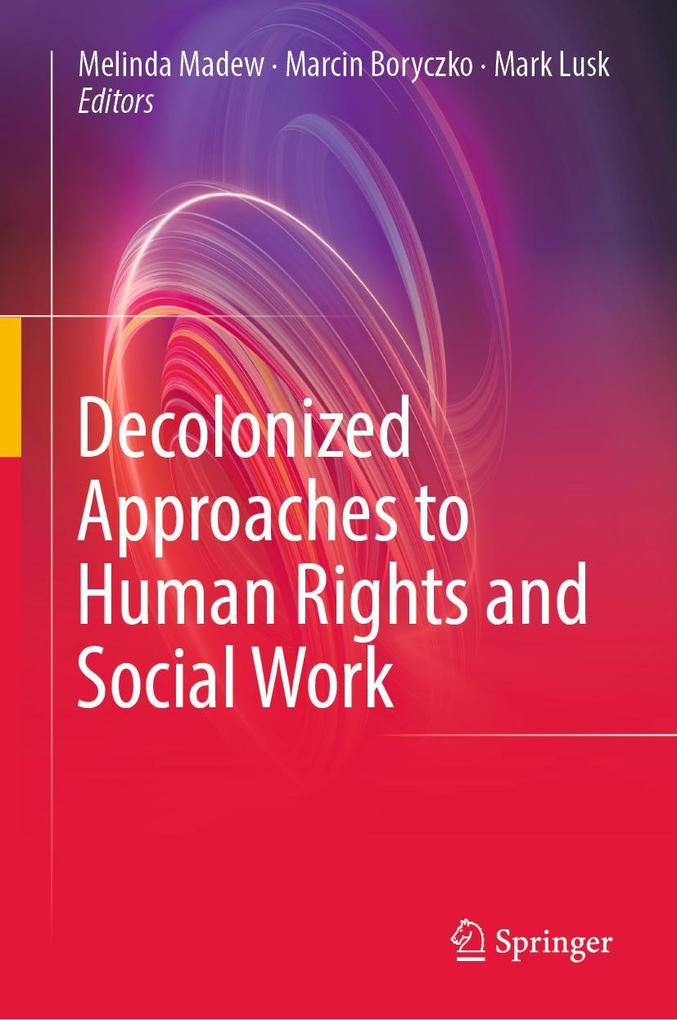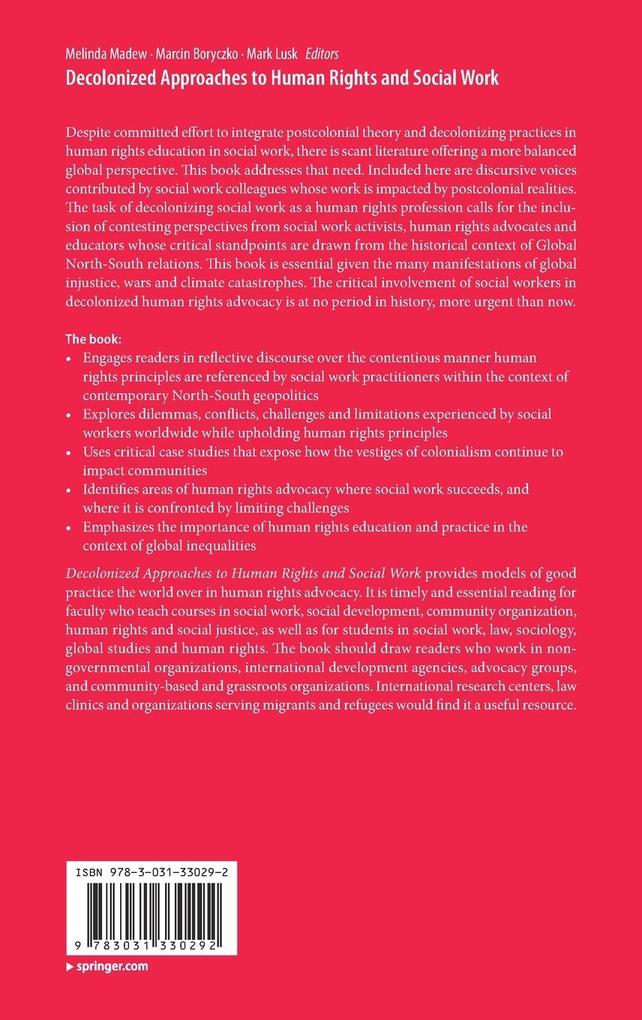
Zustellung: Sa, 21.06. - Mi, 25.06.
Versand in 1-2 Wochen
VersandkostenfreiBestellen & in Filiale abholen:
Despite committed effort to integrate postcolonial theory and decolonizing practices in human rights education in social work, there is scant literature offering a more balanced global perspective. This book addresses that need. Included here are discursive voices contributed by social work colleagues whose work is impacted by postcolonial realities. The task of decolonizing social work as a human rights profession calls for the inclusion of contesting perspectives from social work activists, human rights advocates and educators whose critical standpoints are drawn from the historical context of Global North-South relations. This book is essential given the many manifestations of global injustice, wars and climate catastrophes. The critical involvement of social workers in decolonized human rights advocacy is at no period in history, more urgent than now.
The book:
- Engages readers in reflective discourse over the contentious manner human rights principles are referenced by social work practitioners within the context of contemporary North-South geopolitics
- Explores dilemmas, conflicts, challenges and limitations experienced by social workers worldwide while upholding human rights principles
- Uses critical case studies that expose how the vestiges of colonialism continue to impact communities
- Identifies areas of human rights advocacy where social work succeeds, and where it is confronted by limiting challenges
- Emphasizes the importance of human rights education and practice in the context of global inequalities
Decolonized Approaches to Human Rights and Social Work provides models of good practice the world over in human rights advocacy. It is timely and essential reading for faculty who teach courses in social work, social development, community organization, human rights and social justice, as well as for students in social work, law, sociology, global studies and human rights. The book should draw readers who work in non-governmental organizations, international development agencies, advocacy groups, and community-based and grassroots organizations. International research centers, law clinics and organizations serving migrants and refugees would find it a useful resource.
Inhaltsverzeichnis
Part I - Social Work and the Decolonization Project . - Chapter 1 - Human Rights and the Decolonization of Social Work. - Chapter 2 - Relativism, Universalism and Pluriversality in Human Rights. - Part II History of Social Work as a Human Rights Profession. - Chapter 3 - Interrogating the Colonial Past: The Conflicting History of Social Work as a Human Rights Profession. - Chapter 4 The Postcolonial Present and a Decolonized Future for Social Work. - Chapter 5 - Kinship Care, Responsibility and Self-Determination: Exploring African Individual and Community Rights in Decolonized Social Work. - Part III - Human Rights Mandate in Social Work. - Chapter 6 - Mapping Basic Human Rights Instruments. - Part IV - Situating Human Rights in the Global North-South Divide. - Chapter 7 - Postcolonial Europe and its Premises for Decolonization. - Chapter 8 - Decolonized Approaches to Human Rights and Social Work in the United States. Chapter 9 Challenging Coloniality in Social Work Theorizations on Human Rights. - Part V - Decolonized Approaches in Human Rights Advocacy. - Chapter 10 - Understanding the U. S. -Mexico Border Through a Decolonial Lens. - Chapter 11 Decoding a Colonial Impact The Women s Movement in India. - Chapter 12 From Anti-Colonial Revolutionaries to Subversive Feminists Women in the Philippines. - Chapter 13 Colonial History of Territorial Dislocation and Landlessness Indigenous Peoples and Farmers Food Sovereignty in the Philippines. - Chapter 14 Lessons from Social Movements: Farmers and Food Sovereignty in India. - Chapter 15 - Decolonizing Social Work Education. - Chapter 16 - A Path Forward for Social Work, Human Rights and Decolonization.
Produktdetails
Erscheinungsdatum
13. Juli 2023
Sprache
englisch
Auflage
2023
Seitenanzahl
312
Herausgegeben von
Melinda Madew, Marcin Boryczko, Mark Lusk
Verlag/Hersteller
Produktart
gebunden
Abbildungen
XVIII, 294 p. 2 illus.
Gewicht
635 g
Größe (L/B/H)
241/160/23 mm
ISBN
9783031330292
Entdecken Sie mehr
Pressestimmen
" Decolonized Approaches to Human Rights and Social Work is an edited collection that serves as a valuable resource for students, educators, and practitioners in social work and human rights. . . . The book demonstrates several strengths. One of its key advantages is its interdisciplinary approach, successfully integrating insights from philosophy, legal studies, and social work, making it a well-rounded academic resource. . . . The book is an essential read for anyone committed to social justice and the decolonisation of professional practice. " (Omar Mohamed, Social Work Education, February 12, 2025)
Bewertungen
0 Bewertungen
Es wurden noch keine Bewertungen abgegeben. Schreiben Sie die erste Bewertung zu "Decolonized Approaches to Human Rights and Social Work" und helfen Sie damit anderen bei der Kaufentscheidung.










